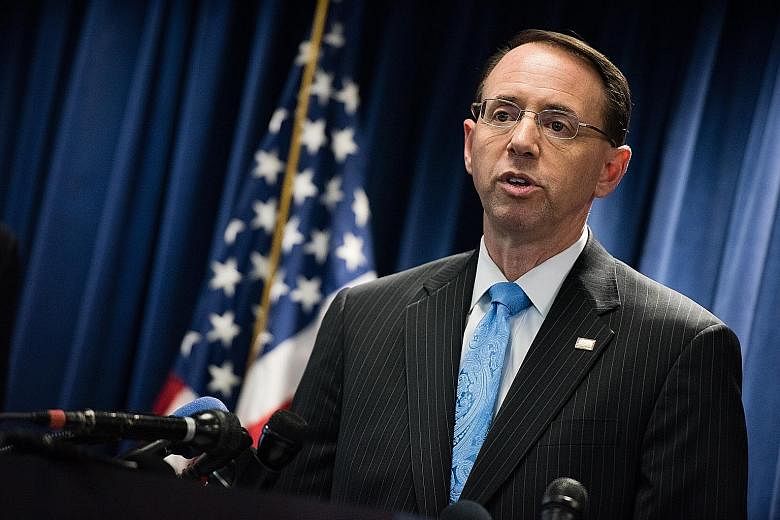United States President Donald Trump's insistence that he was the target of a wiretap ordered by his predecessor Barack Obama has turned the spotlight on his pick for Deputy Attorney-General, Mr Rod Rosenstein.
With Attorney-General Jeff Sessions having recused himself from any investigation concerned with the Trump campaign, it will be his deputy who will head the ongoing probe into ties between Russian officials and top Trump associates during the 2016 election.
Mr Rosenstein, a lawyer, is a 26-year veteran of the Department of Justice. But he has yet to be confirmed and will face intense grilling from Democrats in the Senate.
The wiretap allegation has sharply raised the stakes in the probe. Analysts are watching two aspects closely - how senior Republicans view Mr Trump's allegations, and how these affect his already rocky relationship with the intelligence community.
On Monday, CNN, quoting a source, reported that Federal Bureau of Investigation chief James Comey had been "incredulous" on seeing Mr Trump's Saturday tweets slamming Mr Obama for tapping his phones. On Friday, it was reported that Mr Comey had asked the Department of Justice to publicly refute Mr Trump's claim.
These reports remain unconfirmed but have not been denied.
Opinion among Republicans appears to be mixed. Legislator Jason Chaffetz, who heads the House oversight and government reform committee, told TV networks he had not seen anything directly that would support what the President said.
But he added it would be premature to conclude that Mr Trump had no proof to back up his allegation.
Senate intelligence committee chairman Richard Burr said the panel would "follow the evidence where it leads, and we will continue to be guided by the intelligence and facts as we compile our findings".
Senator John McCain was quoted in the Washington Post as saying that if there was no basis for the charge, there was no reason for an investigation, but "the American people need to know what evidence he has to make such a charge".
White House spokesman Sean Spicer told MSNBC: "The President's tweets speak for themselves. What he wants to do is ensure the House and Senate intelligence committees look into this matter to make sure the American people fully understand what may or may not have happened during the 2016 election."
Professor Glenn Altschuler of Cornell University told The Straits Times: "It is possible to muddy the waters in a way to be able to declare he was right. One scenario is we discover that some individuals in the Trump campaign did have their phone calls monitored. Then his surrogates will say, 'I told you so'."
Mr Trump's approval rating nationally is low but he remains popular among his supporters. The polls reflected the deep split. The daily Rasmussen poll on Monday reported that 52 per cent of "likely US voters" approved of his job performance while 48 per cent disapproved.
An NBC-Wall Street Journal poll done from Feb 18 to 22 found 89 per cent of Republicans remained solidly supportive of the change that he has brought to the presidency.
Prof Altschuler said: "As long as 89 per cent of Republicans support Trump, Republicans in the Senate will go along with an investigation, even if they are sceptical."

